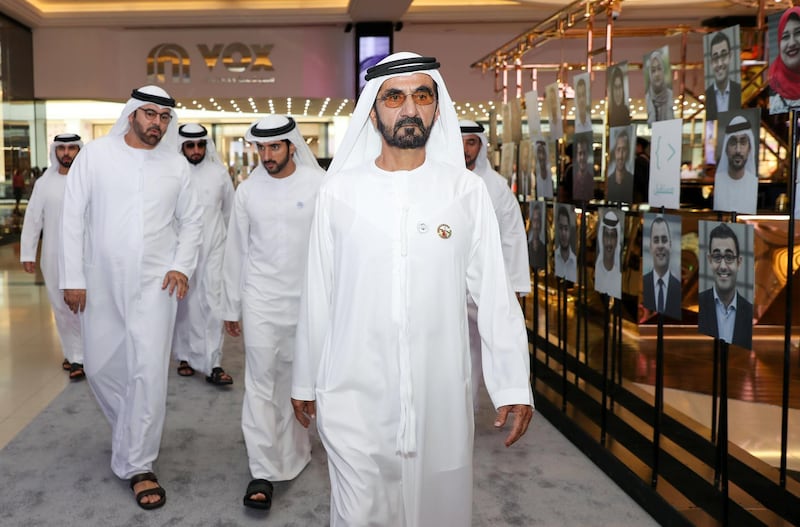Dubai Ruler Sheikh Mohammed bin Rashid has unveiled his 50-Year Charter for the development of the emirate.
The charter marks Sheikh Mohammed's 50 years of service to the country and outlines plans to improve the quality of life in Dubai for its citizens and residents over the next 50 years.
The announcement follows the release on Saturday of a road map for the future success of the nation in the Eight Principles of Dubai, which aims to ensure the city's continued prosperity.
"This document represents our pledge and promise, on behalf of myself and the ruling family of Dubai, of what we will undertake to improve the quality of life, develop the community of Dubai and ensure the future of generations to come," the document, which was signed by the Ruler and overseen by Crown Prince Sheikh Hamdan bin Mohammed, says.
This is a Charter that represents our pledge and promise towards enhancing the life of people in Dubai in 2019. A new charter shall be launched on Jan 4 every year .. https://t.co/Dhvt1PvImt
— HH Sheikh Mohammed (@HHShkMohd) January 6, 2019
The pledges will be updated each year on January 4 and they are split up into nine "articles" that identify specific goals the emirate hopes to achieve.
Over the next 50 years, it says, Dubai will be maintained as "a city governed by law and bound by the spirit of compassion, love harmony and tolerance".
Dubai will remain a "prosperous city where future generations achieve their dreams and aspirations", it promises.
The document does not seek to replace existing strategies – such as the Dubai Plan 2021, which aims to reinforce the emirate's position as a global centre for industry – but instead seeks to build on the government's vision for the "life we wish to maintain for everyone living in this community".
The nine articles include a proposal to foster a Dubai silk road in co-operation with "friendly neighbours" in order to reestablish the city as a trade hub and as a crossroads between east and west, as well as north and south.
No information was given on how this will be achieved or which international bodies would be involved.
Also featured in the document are plans to set up the region's first virtual commercial city, granting commercial licences, residencies and open bank accounts without the need to physically be in Dubai.
Plans for a centralised education system that stores the academic record of citizens were also outlined, as well as plans to establish universities as freezones to encourage student entrepreneurship and creative practice.
_______________
Read more:
A look back at Sheikh Mohammed bin Rashid's 50 years of service to his country
Sheikh Mohamed bin Zayed praises Ruler of Dubai for 50 years of service
[ Welcome to the Year of Tolerance – but what exactly does it mean? ]
_______________
To support business, specialized geo-economic zones will be developed. Each will be independently governed by its own council and governor that will manage and market it, as well as help it achieve its investment goals.
A long-term programme aiming to create new income sources for citizens was also included, with the document stating that some services would be privatised while co-operative companies owned by citizens would be set up. No specific details of how this is projected to work were included.
In healthcare, the charter promises 24-hour access to doctors facilitated by an app and Sheikh Mohammed also pledged to increase philanthropic initiatives each year "by at least an equal percentage of our annual economic growth".
Finally, at least a tenth of Dubai homes will be self-sufficient in terms of water, food and energy through the creation of a new economic sector and in the hopes of helping to preserve the environment.
Sheikh Mohammed began his leadership journey on November 1, 1968, when he was appointed head of Dubai Police and Public Security. On January 4, 2006, he also became the Ruler of Dubai.
In Saturday's eight point plan, he said the steps were integral to national growth and the overall prosperity of the Emirates.
The blueprint for success outlines that the country's union is of utmost importance, no one is above the law, Dubai is a politically neutral business capital, an excellent government, open private sector and globally competitive companies are what drive growth, Dubai has a unique "personality" based on tolerance that should be respected and that the future is based on economic diversification, fostering talent and investing in future generations.
“I call on all those in a position of responsibility in the Emirate of Dubai to abide by these principles, and direct them to devise mechanisms to ensure the implementation of these principles at all events,” Sheikh Mohammed said in a government circular.
If observed by those residing in the UAE, the two plans would ensure "continued prosperity", the Ruler said.







